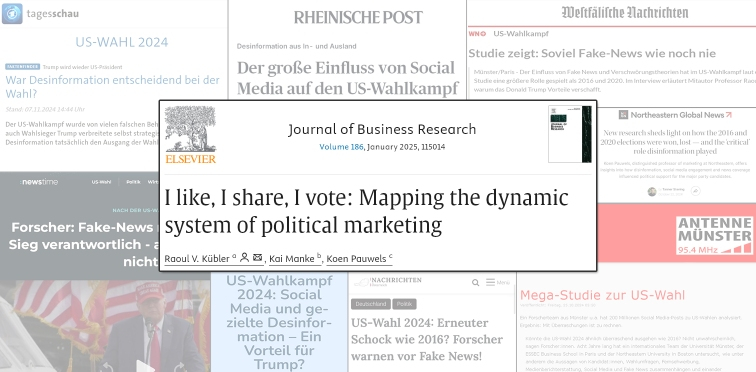Mapping the Dynamic System of Political Marketing - New study attracts widespread media coverage

In the run-up of the 2024 US presidential election, candidates have spent more than 12 billion dollars on marketing. Whether these investments have been effective and how different elements (e.g., candidates own statements, advertising) interact to shape voter behavior, however, has long been a key under-researched area. For eight years, an international team of researchers has investigated the dynamics of political marketing alongside other factors like polls, media coverage and disinformation. In their study recently published in the Journal of Business Research, MCM scholar Dr. Kai Manke (Chair of Marketing & Media, University of Münster) together with Professor Raoul Kübler (ESSEC Business School, Paris) and Professor Koen Pauwels (Northeastern University, Boston) analyze one of the most comprehensive data sets in political science, covering more than 200 million social media interactions from the last US presidential elections. The study shows that candidates' performance in the electoral races largely depends on their own actions: While TV advertising still has an impact, their own social media activities are significantly catching up.
The study also finds a significant and measurable impact of disinformation on voter preferences. Fabricated content shared online quadrupled between 2016 and 2020 and was mostly designed to harm the Democratic nominee, with false claims about immigrants and the compensation for recent hurricane victims peaking in 2024 and clearly aimed at supporting Donald Trump. The authors also addressed that media in the US often follow outrage and engagement on social media. More worrisome from a democratic perspective, however, is news coverage of disinformation. In an attempt to correct false claims or to benefit from sensationalism to generate advertising revenue, journalists grant both attention and credibility to these messages while amplifying their negative impact on voter decision-making.
The study has been covered by various international (e.g., Northeastern Global News, The Conversation), national (e.g., Tagesschau, ProSieben), and local (e.g., Antenne Münster, Westfälische Nachrichten) media outlets.
The research paper “I like, I share, I vote: Mapping the dynamic system of political marketing” by Professor Kübler, Dr. Kai Manke and Professor Koen Pauwels can be downloaded here free of charge:
https://www.sciencedirect.com/science/article/pii/S0148296324005186

